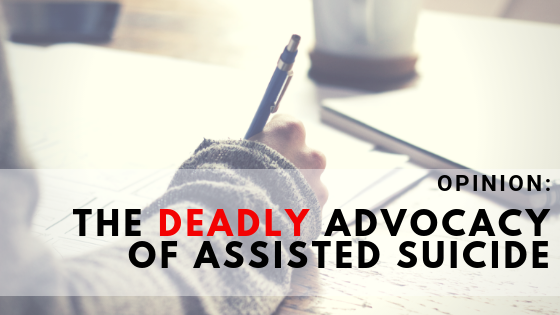The deadly advocacy of assisted suicide [THE WASHINGTON TIMES]

Published 10 October 2018 at The Washington Times: link to original article
By G. Kevin Donovan
ANALYSIS/OPINION:
Preventing suicide, or encouraging it?
The announcement encourages residents to think about assisted suicide and offers resources which help a person pursue it, while all other organizations are trying to find ways to prevent suicide, and help those most in need, and at risk. Aren’t public service announcements supposed to call attention to a message that is in the public interest? Running announcements of this nature is reckless and dangerous, especially during the month dedicated to suicide prevention.
It is no wonder that the assisted-suicide lobby has resorted to such tactics — this dangerous public policy is so unpopular here that in the first year after the District of Columbia enacted a law to allow assisted suicide, not one person killed themselves with a doctor’s help, as the new law sanctions. In fact, during that time only two out of nearly 11,000 licensed D.C. physicians were willing to participate, and just one hospital cleared doctors to be involved.
Instead of veiled advertisements for assisted suicide from advocates, patients and physicians deserve to be given the facts, including the attendant abuses, and to know why so few doctors and hospitals are participating.
Assisted suicide laws create “second class” of people
Despite so-called safeguards, the D.C. assisted-suicide bill fails to adequately protect the most vulnerable in society. The poor, people of advanced years, persons with disabilities, both physical and developmental, and people who experience depression all find themselves at a much higher risk of being placed, even against their will, in that “second class” of people who do not receive the equal protection of suicide prevention.
This type of discrimination is a reality in places where assisted suicide is legal. We know because in Oregon (oregon.gov), where assisted suicide was legalized 20 years ago, feeling like a burden is among the top end-of-life concerns of people who asked for lethal drugs. Making suicide available to people who require significant care and resources conveys that dependency and the need for care is burdensome, perhaps even revolting.
Advocates often say that these laws will be used by only a few. Assisted suicide is the ultimate special interest bill because, for these few, we must place a far greater number at risk of deadly harm through mistakes, coercion and abuse.
Medicalizing suicide
Assisted suicide also breaks down the patient-physician relationship. With these laws, a doctor is legally forbidden from listing suicide as the cause of death on the death certificate. Not only does that require a falsehood, it makes oversight nearly impossible and accurate disease data a thing of the past. These laws do precious little for patients, but they do ensure that doctors cannot be sued or subjected to criminal penalties when acting “in good faith” within this law.
For centuries, a physician’s primary focus has been to cure and comfort. Assisted suicide is an aberration that distorts that focus, medicalizing suicide. The result is a breach of trust between physician and patient — and the real risk that normalizing suicide will lead to “suicide contagion” in others. There is no mystery behind why physicians in Washington are not lining up to participate: It undermines their credibility and runs contrary to their role as healer. And physicians should be wary of promoting suicide for any reason among their patients. More doctors themselves die of suicide than in any other profession.
At a time when public service announcements should be engaged in suicide prevention, patients’ rights and protection of the vulnerable, the opposite is being promoted by one special interest group. As more and more deaths by suicide make the news, and the suicide epidemic unfolds in our country, we should think twice about promoting such harmful messages and patently unpopular public policy.
G. Kevin Donovan is a physician and director of the Pellegrino Center for Clinical Bioethics and professor at Georgetown University Medical Center.